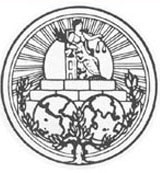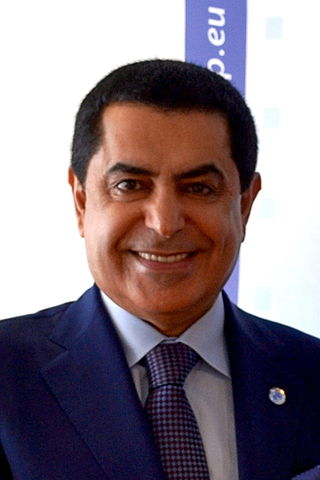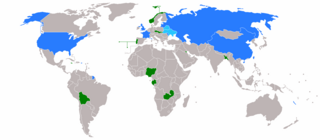
The International Court of Justice, also called the World Court, is one of the six principal organs of the United Nations (UN). It settles disputes between states in accordance with international law and gives advisory opinions on international legal issues. The ICJ is the only international court that adjudicates general disputes between countries, with its rulings and opinions serving as primary sources of international law.

The United Nations General Assembly is one of the six principal organs of the United Nations (UN), serving as its main deliberative, policymaking, and representative organ. Currently in its 77th session, its powers, composition, functions, and procedures are set out in Chapter IV of the United Nations Charter. The UNGA is responsible for the UN budget, appointing the non-permanent members to the Security Council, appointing the UN secretary-general, receiving reports from other parts of the UN system, and making recommendations through resolutions. It also establishes numerous subsidiary organs to advance or assist in its broad mandate. The UNGA is the only UN organ where all member states have equal representation.
Abdul Gadire Koroma is a Sierra Leonean jurist. He was the ambassador of Sierra Leone to the United Nations between 1981 and 1985. He served two terms as judge at the International Court of Justice.

United Nations Security Council Resolution 1914, adopted unanimously on 18 March 2010, after noting the resignation of International Court of Justice (ICJ) judge Shi Jiuyong and that the vacancy must be filled in accordance with the Statute of the ICJ, the Council decided that the election to fill the vacancy would take place on 29 June 2010 at a meeting of the Security Council and at a meeting of the General Assembly at its 64th session.

United Nations Security Council resolution 1361, adopted without a vote on 5 July 2001, after noting the resignation of International Court of Justice (ICJ) judge Mohammed Bedjaoui taking effect on 30 September 2001, the council decided that elections to the vacancy on the ICJ would take place on 12 October 2001 at the security council and at a meeting of the general assembly during its 56th session.

Xue Hanqin is a Chinese jurist at the International Court of Justice. On 29 June 2010, she was elected to fill the vacancy created by Shi Jiuyong's resignation on 28 May 2010. She is one of three female judges serving on the International Court of Justice (ICJ) and one of only four women elected as members of the Court to date. Xue is the fifth Chinese judge at the ICJ, and the third representing the People's Republic of China.
Joan E. Donoghue is an American lawyer, international legal scholar, former U.S. State Department official, and the current president of the International Court of Justice (ICJ). She was first elected to the court in 2010, re-elected in 2014, and elected by the ICJ judges to be president of the ICJ in 2021. She is the third woman to be elected to the ICJ and the first American woman elected as president of the Court.

United Nations Security Council resolution 1571, adopted without a vote on 4 November 2004, after noting the resignation of International Court of Justice (ICJ) judge Gilbert Guillaume taking effect on 11 February 2005, the council decided that elections to the vacancy on the ICJ would take place on 15 February 2005 at the security council and at a meeting of the General Assembly during its 59th session.

Julia Sebutinde is a Ugandan judge serving her second term on the International Court of Justice following her re-election on November 12, 2020. She also is the current chancellor of Muteesa I Royal University, a university owned by Buganda kingdom. She has been a judge on the court since March 2012. She is the first African woman to sit on the ICJ. Before being elected to the ICJ, Sebutinde was a judge of the Special Court for Sierra Leone. She was appointed to that position in 2007.

The Sixty-sixth Session of the United Nations General Assembly opened on 13 September 2011 at 15:00 and was presided over by former Qatari permanent representative to the UN Nassir Abdulaziz Al-Nasser. The session ended on 18 September as al-Nasser symbolically passed the gavel to the president of the next session, Vuk Jeremic.
The 2011 International Court of Justice election began on 10 November 2011 at United Nations Headquarters in New York City. In the set of triennial elections, the General Assembly and the Security Council concurrently elect five judges to the Court for nine-year terms, in this case beginning on 6 February 2012. From the eight candidates, the five winners were Giorgio Gaja (Italy), Hisashi Owada (Japan), Peter Tomka (Slovakia), Xue Hanqin (China) and Julia Sebutinde (Uganda).

The 1978 United Nations Security Council election was held on 10 November 1978 during the Thirty-third session of the United Nations General Assembly, held at United Nations Headquarters in New York City. The General Assembly elected Bangladesh, Jamaica, Norway, Portugal, and Zambia, as the five new non-permanent members of the UN Security Council for two-year mandates commencing on 1 January 1979. Notably, Bangladesh, Jamaica and Portugal were elected members of the council for the first time.

The 2014 Illinois judicial elections consisted of both partisan and retention elections, including those one seat of the Supreme Court of Illinois for ten seats in the Illinois Appellate Court. Primary elections were held on March 18, 2014, and general elections were held on November 4, 2014. These elections were part of the 2014 Illinois elections.
The 2017 International Court of Justice election took place from 9 to 20 November 2017 at the United Nations Headquarters in New York City. In the set of triennial elections, the General Assembly and the Security Council concurrently elect five judges to the Court for nine-year terms, in this case beginning on 6 February 2018. From the seven candidates, the five winners were Abdulqawi Yusuf (Somalia), Antônio Augusto Cançado Trindade (Brazil), Nawaf Salam (Lebanon), Ronny Abraham (France) and Dalveer Bhandari (India).
The 1959 United Nations Security Council election was held between 12 October and 12 December during the fourteenth session of the United Nations General Assembly, held at United Nations Headquarters in New York City. The General Assembly elected three members through consultation of the president, as non-permanent members of the UN Security Council for two-year mandates commencing on 1 January 1960.
The 2020 International Court of Justice election were held on 11 and 12 November 2020 at the United Nations Headquarters in New York City. In the set of triennial elections, the General Assembly and the Security Council concurrently elect five judges to the Court for nine-year terms, in this case beginning on 6 February 2021. From the eight candidates, Yuji Iwasawa (Japan), Xue Hanqin (China), Peter Tomka (Slovakia), Julia Sebutinde (Uganda), and Georg Nolte (Germany) have been elected members of the International Court of Justice for a term of office of nine years, as both the Security Council and the General Assembly have agreed on the same candidates.
The 2018 International Court of Justice election was held on 22 June 2018 at the United Nations Headquarters in New York City. The General Assembly and the Security Council concurrently elected Yuji Iwasawa (Japan) to the International Court of Justice until 5 February 2021. He served the remainder of the nine-year term of office that had been held by Hisashi Owada (Japan), whose resignation from the Court took effect on 7 June 2018.
The 2021 International Court of Justice election was held on 5 November 2021 at the United Nations Headquarters in New York City. The General Assembly and the Security Council concurrently elected Hilary Charlesworth (Australia) to the International Court of Justice for remainder of the nine-year term of office that had been held by Judge James Crawford (Australia).
The 2022 International Court of Justice election was held on 4 November 2022 at the United Nations Headquarters in New York City. The General Assembly and the Security Council concurrently elected Leonardo Nemer Caldeira Brant for remainder of the nine-year term of office that had been held by Judge Antônio Cançado Trindade, who died in May, 2022.
The 2023 International Court of Justice election is scheduled to be held on 9 November 2023 at the United Nations Headquarters in New York City. In the set of triennial elections, the General Assembly and the Security Council concurrently elect five judges to the Court for nine-year terms.









